Nature, History, and Japanese Culture! 5 Types of Tours to Enjoy in Ibaraki

Ibaraki, located northeast of Tokyo, is a nature-rich prefecture that boasts stunning scenery, exceptional cuisine, and a wide range of cultural and outdoor activities. We introduce five exclusive tours that allow visitors to enjoy the best of Ibaraki, including rare experiences!
Sublime Relaxation in Ibaraki

Kairakuen Garden viewed from above
Ibaraki, located northeast of Tokyo and facing the Pacific Ocean, boasts splendid mountainous areas, hills, and plains. Hitachi Seaside Park, a prime flower destination, the science city of Tsukuba, as well as Kairakuen Garden, one of Japan's three famous gardens, are all located in Ibaraki.
Moreover, due to the variety and richness of ingredients that are cultivated here, Ibaraki is often called "the kitchen of Eastern Japan." Visit Mito, Ibaraki's capital city, or Oarai, a town on the Pacific coast, and you'll be able to taste some of the finest Japanese cuisine and sake beverages.
We introduce five exclusive tours in Ibaraki that give visitors a chance to enjoy the best that Ibaraki has to offer in terms of nature, cuisine, history, and culture. All these tours are two-day trips that can be booked online (*the reservation page is temporarily unavailable).
5 Excellent Tours in Ibaraki
1. Ibaraki History and Culture Tour
2. Ibaraki Artisan Craft Tour
3. Ibaraki Outdoor Activity Tour
4. Ibaraki Cuisine Tour
5. Ibaraki Relax & Refresh Tour
1. Ibaraki History and Culture Tour

Photo by Pixta
Ibaraki's Mito City played an important role during the Edo period (1603-1868) as a domain under the direct rule of a Tokugawa shogunal family branch. The Ibaraki History and Culture Tour takes you to prominent historical sites and places that offer unique experiences of Japanese culture.
This tour includes a lantern-making workshop, a demonstration of Japanese swordsmanship, and an exclusive dinner in a historical building within Kairakuen Garden. Participants will also visit the Great Buddha of Ushiku, a 120-meter Buddhist statue that is home to an entire temple, galleries, and even an observatory. Below we introduce some of the tour highlights.
Kairakuen Garden

Kairakuen Garden, one of Japan's three famous gardens along with Kenrokuen in Kanazawa and Korakuen in Okayama, was built by Tokugawa Nariaki (1800 - 1860), the lord of the Mito clan, in the 1840s. Located in Mito, the capital city of Ibaraki, Kairakuen Garden is renowned as a plum blossom viewing spot. Plum blossoms have been loved since ancient times in China and Japan, being featured in art and poetry.
Kobuntei, the building inside the garden, was lost to fire in 1945 during the World War II bombings but was rebuilt after 1955; the reconstruction of this historic landmark lasted three years. Its rooms are decorated with artwork and objects dating back to lord Nariaki's times.
Those who take part in the Ibaraki History and Culture Tour have the exclusive opportunity to enjoy dinner in one of the rooms within Kobuntei. Usually, this building cannot be accessed after closing hours. Moreover, eating and drinking are forbidden in the precincts. However, participants in this very special tour will have dinner at Kobuntei while enjoying the views of the garden in the evening.
Kodokan Mito Han School, a Historical Academy

Kodokan Mito Han School is an educational institution founded in 1841 by lord Tokugawa Nariaki. Not only was it the largest facility of its kind at that time, but it was also built within Mito Castle, proof that education was held in high regard by the lord. The young members of samurai families attended this school. Organized like a university, Kodokan Mito Han School offered classes in various subjects such as history, medicine, astronomy, military strategy, and martial arts.
During the tour, you'll be able to visit the rooms inside and see the exhibits accompanied by an English-speaking guide. The building preserves the dignified atmosphere of the last years of the Edo period (1603-1868).
The Great Buddha of Ushiku
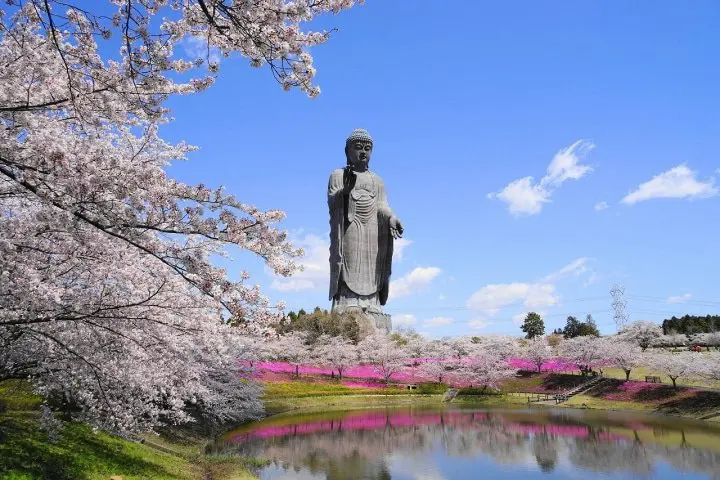
The Great Buddha of Ushiku in early April. Photo by Pixta
Ushiku Daibutsu, or the Great Buddha of Ushiku city, is a 120-meter statue of Amidha Nyorai. Usually, Buddhist statues are housed in temples, but in the case of this monument, the temple is inside the statue!
The statue is also home to galleries showing photos of how it was built, as well as to an observatory that offers unobstructed views of the surroundings.
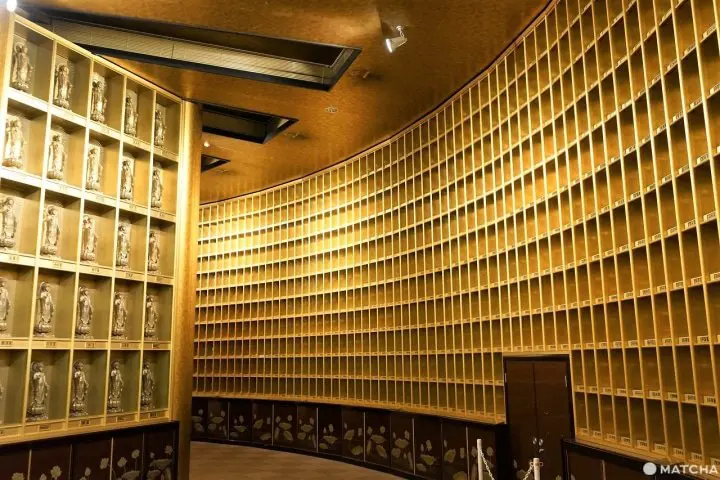
A visit here is a chance to learn about Japanese spirituality and actually see Buddhist rituals offered to the souls of the ones departed. Although visitors and tourists are allowed inside, please keep in mind at all times that this is a religious facility.
↑ Return to the top of article.
2. Ibaraki Artisan Craft Tour
This tour includes visits to local artisan studios in Ibaraki. See how some of Japan's most beautiful fireworks are made and help launch them! Or try your hand at making fine Japanese paper after learning the basics from a professional.
Other highlights include a traditional incense stick factory and a workshop specializing in paper lanterns. We introduce some of the facilities below.
Launching Fireworks at Nomura Hanabi Kogyo

Nomura Hanabi Kogyo is an award-winning firework manufacturer based in Mito. If you take part in this tour, you'll visit their factory and see how the intricate, colorful fireworks are made.

Moreover, participants also have the chance to assist with launching fireworks by the river. All you have to do is press a button but it's an amazing experience to witness the whole process of launching fireworks and seeing them up close.
Tour an Incense Stick Factory! Komamura Seimeido

Incense sticks are widely used in Japan, not only to enjoy the fragrance but also in Buddhist rituals and prayers made for the departed. A visit to Komamura Seimeido is a chance to see how natural incense is made fom cedar wood.

A well-established incense manufacturer, Komamura Seimeido uses traditional methods that are environment-friendly. The impressive machinery that turns cedar into incense is set in motion using a waterwheel!
You'll be guided throughout the factory by the director of Komamura Seimeido himself. Participants have the chance to smell several types of incense made here and even purchase their favorite ones at the shop.
↑ Return to the top of article.
3. Ibaraki Outdoor Activity Tour

Photo by Pixta
Those who love spending time amid nature and outdoor activities shouldn't miss out on the exciting activities available in Ibaraki. Tsukuba Kasumigaura Ring Ring Road, one of the most picturesque cycling courses in Japan, is a must-visit! After relaxing overnight at a local ryokan, why not hike Mt. Tsukuba, a mountain connected to Japan's creation myths?
You can also experience yabusame, the traditional art of horseback archery, and learn basic archery skills from professional yabusame practitioners.
Cycling on Tsukuba Kasumigaura Ring Ring Road

Photo by Pixta
Tsukuba Kasumigaura Ring Ring Road is a 180-kilometer cycling course that extends across several cities in southern Ibaraki. It has been designated a National Cycling Route due to the beauty and variety of its natural surroundings.
In the frame of the Ibaraki Outdoor Activity Tour, you'll be cycling through one of the most picturesque sections of the route, from Tsuchiura to the foot of Mt. Tsukuba. This section is lined with cherry trees that look splendid in spring.
Part of the Ring Ring Road was built over the tracks of Tsukuba Railway Line, which is now out of service. The former train stations still remain and serve as rest stops along the cycling route.
Hiking on Mt. Tsukuba

Mt. Tsukuba (877 meters) is a popular destination for mountain climbing enthusiasts. As part of the tour, participants will be hiking along the Shirakumobashi trail, which is intermediate level in terms of difficulty.
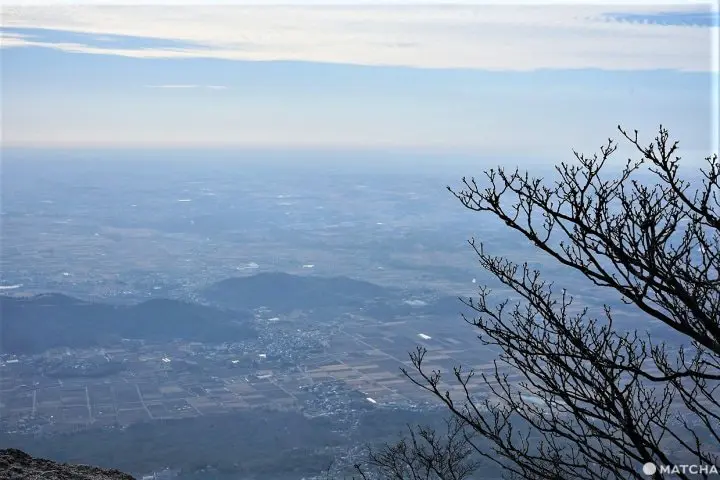
The guide will show you around Tsukubasan Shrine, where all climbers pray for a safe ascent. Along the way, there are many highlights including unusually shaped rocks and small Shinto shrines. The summit can be reached in about two hours at a normal pace. A breathtaking view of the Kanto Plain awaits at the summit! To descend, you'll be taking the ropeway or cable car.
Horseback Archery Experience at Yamato Horse Park

Yabusame, or traditional horseback archery, is something that you can witness at important shrine festivals. But seeing this display of amazing skill is very different from actually trying it yourself!
As part of this tour, you'll be visiting Yamato Horse Park, the headquarters of yabusame performers in Ibaraki. You'll don traditional yabusame attire, learn the basics of archery from a professional, and even try it from the back of a horse!

Thanks to the sensei's instructions and basic training, you'll be hitting those targets in no time! Moreover, a master of the art will actually do a demonstration of yabusame while riding a horse at full speed. It's an incredible show that will leave you in awe!
↑ Return to the top of article.
4. Ibaraki Cuisine Tour

Ibaraki is renowned for its exquisite seafood, as well as for flavorful vegetables and fruit. Book the cuisine tour if you wish to enjoy the best of Ibaraki food!
On the first day, you'll join local fishermen for a fishing adventure in the Pacific Ocean and enjoy a delicious dinner at a well-established Japanese restaurant. Lunch on the second day consists of a special menu, in which high-quality Japanese sake is paired with refined kaiseki cuisine. The tour includes a visit to a miso factory where you'll learn how miso paste, one of the staple ingredients in Japanese cuisine, is made.
Live Kitchen and Overnight Stay at Oarai Yamaguchiro Ryokan

Yamaguchiro is one of Ibaraki's famous brands when it comes to exquisite cuisine. Besides the ryotei (high-class Japanese restaurant) in Mito City, Yamaguchiro operates a ryokan in the town of Oarai. As part of the Cuisine Tour, you'll be staying overnight at the splendid Oarai Yamaguchiro Ryokan and enjoy refined Japanese cuisine and a hot spring bath.
The sumptuous dinner starts with a live kitchen event, where the leading chef of the facility fillets fish and prepares the ingredients for the evening.

Dinner is then cooked right before your eyes on teppan iron plates. The menu includes the best of what Japan has to offer in terms of food, from flavorful vegetables to seafood and excellent meat (pork and beef). This exclusive, generous menu is a chance to savor high quality Japanese cuisine.

After a good night's rest in the ryokan's comfortable rooms, you'll be treated to a healthy, delicious Japanese breakfast prepared by the master chefs at Yamaguchiro. Every bite is a piece of heaven!
Japanese Cuisine and Sake Pairing at Sudo Honke

Sudo Honke Inc. is a leading sake brewery in Ibaraki. During the tour, you'll be visiting their headquarters and enjoy an exclusive lunch menu that pairs award-winning sake with refined Japanese cuisine.

The cuisine is provided by Yamaguchiro, a famous ryotei in Mito. The sake is served in glasses so that participants can enjoy both the fragrance and the visual appearance of the beverages. The exquisite mariage of flavors will surely leave a lasting impression!
↑ Return to the top of article.
5. Ibaraki Relax & Refresh Tour

Fukuroda Falls. Photo by Pixta
To visitors who wish to take part in relaxing, wellness-oriented activities, we recommend the Ibaraki Relax & Refresh Tour. This tour includes a stay at a hot spring ryokan and a first-class kaiseki cuisine dinner.
On the second day, you'll see Fukuroda Falls, one of Japan's most impressive waterfalls, and take part in a forest therapy session. You'll try your hand at making a wooden bench for the local community, as well as making tofu and aromatic candles. A visit to a traditional lacquerware studio is also included.
Carpentry Workshop at Kikuchi Hitoshi Architecture Office

Ever thought of bringing your contribution to the community living in the area you're visiting? During this tour, you'll be able to take part in a local initiative to make wooden benches for the local elderly population. This workshop is provided by the Kikuchi Hitoshi Architecture Office, an enterprise located in the town of Daigo.

Surrounded by the fragrance of wood, you'll find yourself focusing on making a bench. It's an incredibly fun and rewarding experience. When the bench is done, you'll be able to test it yourself, then leave your sign on it. It will be eventually placed in the town to be used by local residents.
Forest Therapy in Okukuji Forest
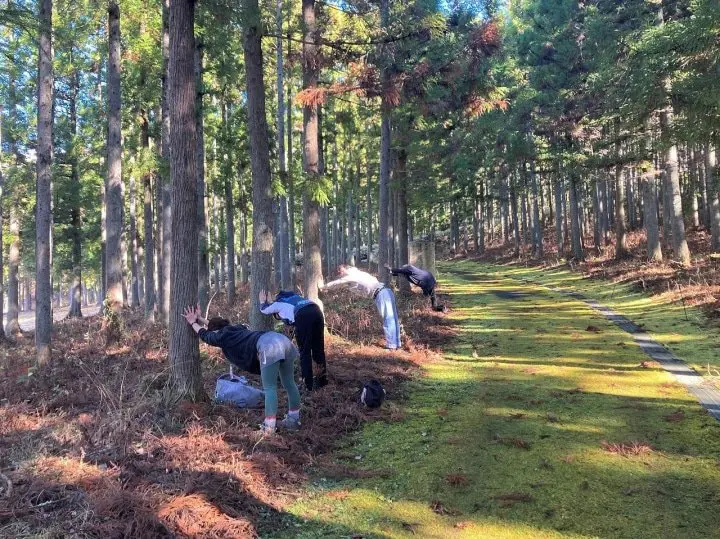
After a relaxing stay at a local hot spring ryokan, participants will take part in a forest therapy session in Okukuji Forest. The session consists of simple stretching exercises. Inhaling fresh forest air while exploring this secular forest will make you feel refreshed and full of energy.
↑ Return to the top of article.
Enjoy the Best of Ibaraki!
The five tours introduced above were created out of the wish to have visitors experience the very best of what Ibaraki has to offer.
If you're dreaming of a truly special experience of refined Japanese culture close to Tokyo, then do consider booking one of these tours.
Read also
Supported by Ibaraki Prefecture and Kinki Nippon Tourism Mito Branch
Main image by Pixta
MATCHA's promotional account for corporate and local government advertising. We aim to provide useful information to our readers in an enjoyable manner.






























![[Company Visit List] Learn from Japanese Business Leaders: Factory Tours & Corporate Visits in Southern Osaka Featuring Manufacturing Technology and Management Philosophy](https://resources.matcha-jp.com/resize/720x2000/2024/12/13-215168.webp)
![[Recommended accommodation in Ureshino Onsen] 1.5 hours from Hakata Station! Enjoy Japanese tea and skin-beautifying hot springs at Saga Ureshino Onsen URESHINO YADOYA](https://resources.matcha-jp.com/resize/720x2000/2025/06/14-236549.webp)
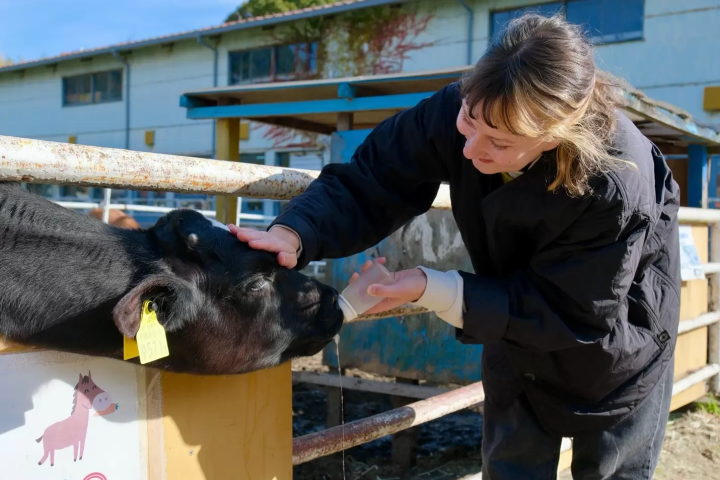
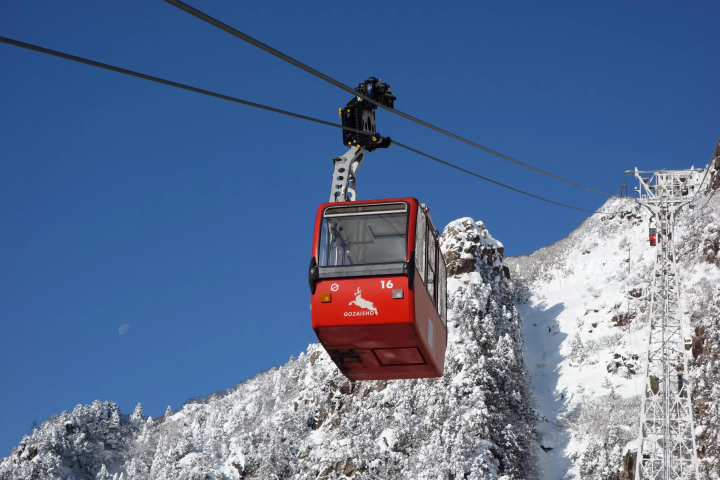
![[Kagoshima] Overcoming 12 Years of Hardship: Walking through Minamisatsuma City, the sacred land where the monk Ganjin landed](https://resources.matcha-jp.com/resize/720x2000/2026/02/21-259481.webp)